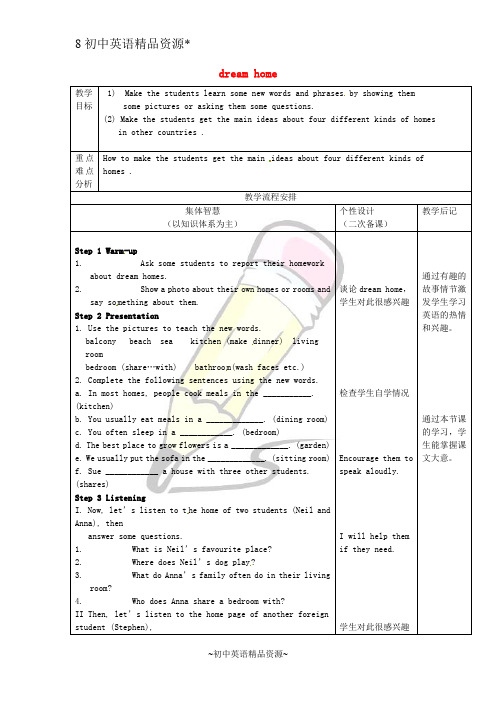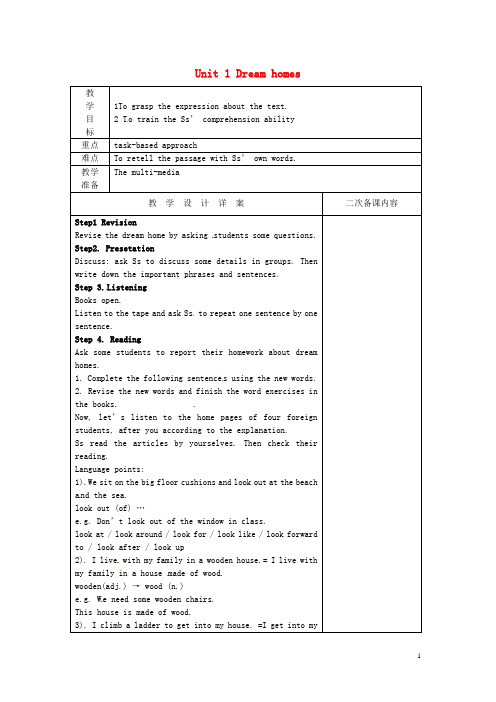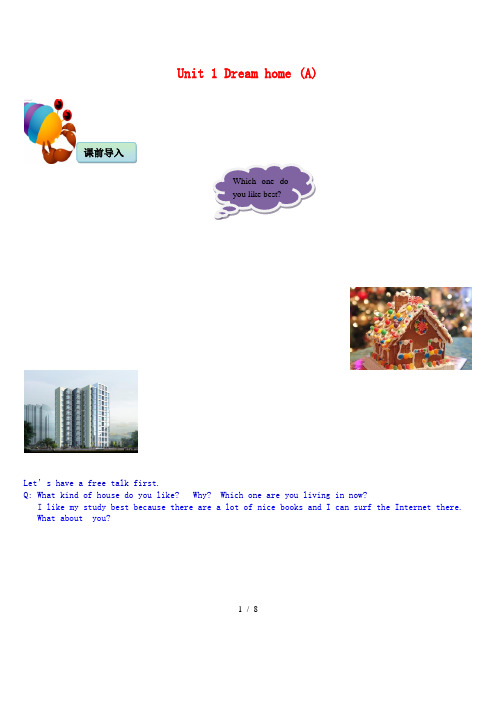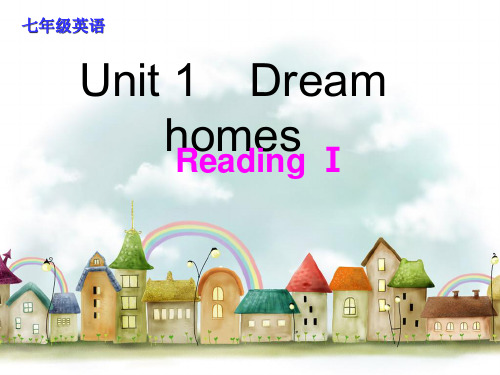江苏省兴化市昭阳湖初级中学七年级英语下册《Unit 1 Dream homes Reading 2》教案 (新版)牛津版
- 格式:doc
- 大小:75.50 KB
- 文档页数:2

dream home教学目标 1) Make the students learn some new words and phrases by showing themsome pictures or asking them some questions.(2) Make the students get the main ideas about four different kinds of homesin other countries .重点难点分析How to make the students get the main ideas about four different kinds of homes .教学流程安排集体智慧(以知识体系为主)个性设计(二次备课)教学后记Step 1 Warm-up1. Ask some students to report their homeworkabout dream homes.2. Show a photo about their own homes or rooms andsay so mething about them.Step 2 Presentation1. Use the pictures to teach the new words.balcony beach sea kitchen (make dinner) living roombedroom (share…with)bathroo m(wash faces etc.)2. Complete the following sentences using the new words.a. In most homes, people cook meals in the ___________. (kitchen)b. You usually eat meals in a _____________. (dining room)c. You often sleep in a ____________. (bedroom)d. The best place to grow flowers is a _____________. (garden)e. We usually put the sofa in the _____________. (sitting room)f. Sue ____________ a house with three other students. (shares)Step 3 ListeningI. Now, let’s listen to t he home of two students (Neil and Anna), thenanswer some questions.1. What is Neil’s favourite place?2. Where does Neil’s dog play?3. What do Anna’s family often do in their livingroom?4. Who does Anna share a bedroom with?II Then, let’s listen to the home page of another foreign student (Stephen), 谈论dream home,学生对此很感兴趣检查学生自学情况Encourage them tospeak aloudly.I will help themif they need.学生对此很感兴趣通过有趣的故事情节激发学生学习英语的热情和兴趣。

Unit 1 Dream homesComic strip & Welcome to the unitI. Teaching aims and learning objectivesBy the end of the lesson, students should be able to:1. understand and act out the comic strip;2. correctly say the name, the capital, a place of interest, the language and thepeople of the six countries on Page 7.II. Teaching contents1. New words and phrases: palace, town, Canada, France, Japan, Russia, UK, London,country, capital, next to2. New structures: I’d like to live next to a restaurant.There are twenty restaurants in town.The biggest one in Fifth Street!Is Tokyo the capital of Japan?III. Focus of the lesson and predicted area of difficulty1. To read the proper nouns on Page 7 correctly and remember them well.2. To get enough information for the conversation from the teacher’s presentationand the discussion with classmates.3. To talk about the student s’ own favourite countries.IV. Teaching proceduresComic stripStep 1 Lead-inFree talk(1) How was your winter holiday?(2) Did you have a good time?(3) What did you do?(4) Where did you go?(5) What was the best part of your winter holiday?Step 2 Presentation1. Watch and answer.T: Eddie and Hobo are also talking about their dream homes. Watch the cartoon and answer the questions: Would Eddie like to live in a palace? Do you understand the meaning of this new word “palace”?2. Read and learn.T: Let’s open the book and tell me where Eddie would like to live.T: Good! What does “next to” mean in Chinese? And what about “fifth”? 3. Language points.T: Read aloud after the tape and learn the language points.(1) would like to do … = want to do(2) live in a palace(3) live next to a restaurant(4) in town(5) the biggest one in Fifth StreetStep 3 Practice1. Play roles and practise in pairs.T: Work in pairs and act out the story. I’ll ask some pairs to act in front of the class.2. Complete a short story.Welcome to the unitStep 1 Part A1. Presentation and learn.Show pictures to learn about different countries: Japan, the USA, France, Canada, the UK and Russia.JapanT: Boys and girls, please look at the picture. Who knows the name of this place?T: Yes, it’s Mount Fuji. There is thick white snow at the top of the mountain all year round. The view in and around this mountain is really wonderful. Do you know which country it is in?T: That’s right. It’s in Japan. Mount Fuji is near Tokyo, the capital of Japan.Do you understand the meaning of “capital”?T: What do we call the people who live in Japan? Yes, we call them Japanese or Japanese people. And “Japanese”also means the language that Japanese people speak.T: We’ve learnt something about Japan. Would you please say something about this picture or this country? For example, the capital of Japan is Tokyo. Who’d like to go on?T: Good job! So much for this picture. Now, look at the next picture.2. Look and match.Finish Part A on Page 7.3. Complete and say.T: We’ve learnt a lot about different countries. Let me help you remember them well. Look at this table. First, would you please complete it?T: Would you please say several sentences about each country? You can first practise with your partner. Then I’ll ask some of you to report one of them to the class.Step 2 Part B1. Listen and answer.(1) Which picture are Annie and Simon talking about?(2) What do you know from their conversation?2. Read aloud.3. Make up similar conversations.Step 3 PracticeShow pictures of famous people from the six countries and ask the students to do the question chains. Vote for the best question and the best answer.T: I’ll show you some famous people from the six countries. Let’s do a “question chain”. Six questions for each of them. Let’s see who will raise the best question and who will give the best answer. Are you ready? OK. Let’s start from …T: Great! Most of you did a very good job. Which question and which answer do you think are the best?V. Homework1. Tell your parents about your favourite country among the six in English.2. Remember the new language points.。

Dream homes课题7B Unit1 Dream homes 总第 1 课时教学目标1learn different names of different countries and cities2learn how to talk about the dream homes教学重点Have a discussion in groups, and talk about their dream homes.教学难点Have a discussion in groups, and talk about their dream homes教 学 过 程(教学环节、教师活动、学生活动)二次备课Step1 Warm-up (presentation)1. Ask if any students have lived in anothercountry. Elicit from students ideas about an idealplace to live.2.Do a mini-survey. Ask students which is theirfavourite place to live.Step2. ListeningListen to the tape, answer my question, Which isEddie’s fav ourite place to live? Help the Ss toanswer.Listen again, Ss read after the tape recorder,then act it out.Step3. Language points1.I’d like to live next to a restaurant.① would like sth.= want sthwould like to do sth = want to do sthe.g. Would you like some water?= Do you want somewater?Would you like to go with us? Yes, I’d love/ liketo.=Do you want to go with us? Yes, I do.② next to =besidee.g. Tom’s house is next t o mine.Jack wants tosit next to me.2. Learn about homes in different countries.① learn aboutI want to learn more about the world.② learn fromWe should help each other and learn from each other.③ different → samein different classes in the same classStep4. Countries and capitals1.Ask students to study the pictures on page 7.2.Say: The capital of China is Beijing . The Capital is the most important city in a country. Ask students to do Part B. Ask them to check with others.Step5. Discussion (task)Have a discussion in groups of four to talk about their dream homes. Each group will choose a student to tell us about his / her dream home. Why?Language points:The capital of the USA is Washington D.C.the capital of ……e.g. Nanjing is the capital of Jiangsu Province. The capital of China is Beijing.Step6. Sum-upGo through the new words and the language points learnt during this lesson.Step7. Homework1. Review the contents of this lesson.2.Write articles about students’ dream homes.教学反思年级:初一 学科:英语课题7B Unit1 Dream homes Reading (I) 总第 2 课时教学目标1. To understand different countries living environment.2. To access to the information of different ways of life.3. The study description, description of the others home life style.教学重点1. How to describe home, description way of life.2. The phrase and the sentence pattern: master教学难点1. How to describe home, description way of life.2. The phrase and the sentence pattern: master 教 学 过 程(教学环节、教师活动、学生活动)二次备课Step1. Free talkWhere would you like to live in? Why do you like it? What’s the capital of the UK? Use these sentences to make a dialogue.Work in pairsStep2 Show the aimsShow the learning aims to the students.Step 3 PresentationTeacher says My dream home isn’t a flat because it is too small. I wouldn’t like to live in a palace because it is too big. I would like to live in a house like this. Then show a picture of a wooden house with two floors. Tell the students look , here is a beautiful house .It is my dream home. It isn’t in a big city. It is in a town and near the sea. When I am free, I can walk on the beach and enjoy the sunshine. It is a wooden house. Do you like my dream home?Then, ask What rooms do I need to be my dream home? and teach the new words.Step 4 PracticeDo you live in a flat or in a house?What rooms do you have?What do you do in each of these rooms?Ask and answer in pairs.Step 5 Reading1. In China, most of us live in tall buildings. What about people in other countries? Do you knowe.g. We should share in our sorrows as well as joys.7. Our neighbours are friendly and we are happy here.e.g.I’m friendly with her.be friendly to sbe.g. People are usually friendly to foreign friends.8.Simon wrote down the meaning of some of the words.①write + n. +down=write down +n. write it/them downe.g. Can you write down the words on your book ?= Can you write the words on your book?②meaning (n.) → mean(v.)e.g. What’s the meaning of “quick?= What does “quick” mean?9.A garden is the best place to grow flowers.e.g. It’s really a good place to go.I’m hungry. Do you have anything to eat?9.Stephen is lying on his bunk beds.lie → lying tie → tying die → dying tell a liee.g. Don’t tell a lie any more. It’s not good for you.Step7.Homework1.Recite the new words and the text.2.Retell the home pages of the two students.教学反思年级:初一 学科:英语课题7B Unit1 Dream homes Reading (Ⅱ)总第 3 课时教学目标1. Master the new words and phrases2. Get the students to learn how to describe their own dream homes.3. Improve the students ’ speaking and writing ability.教学重点1.Get the students to learn how to describe their owndream homes.2.Improve the students ’ speaking and writingability.教学难点1.Get the students to learn how to describe their owndream homes.2.Improve the students ’ speaking and writingability.教 学 过 程(教学环节、教师活动、学生活动)二次备课Step1 RevisionRevise the contents we learned yesterday by askingthem some questions about different kinds of homesof the four students.Step2 Phrases1.Group work. The students work in groups of fourto check the useful phrases in the pages.2. List the phrases on the blackboard. Talk aboutthem with the class.Step3 RetellingAsk more able students to retell the four pageswith the help of phrases on the blackboard.Step4. ConsolidationsAsk less able students to fill in the blanksaccording to the phrases on the blackboard.Ask the students to do P11, C1. If the sentence iswrong, find out the mistake and correct it.P11, C2. Read the words in the box first. Then asksome questions about each picture. Next, get thestudents to fill in the blanks by themselves.Finally, read the sentences loudly.Group work. The students work in groups of four tomake up sentences to talk about different rooms.Ask less able students to write down the sentencesin the notebook. Model sentence: We usually eatmeals in a dining room. Then, ask students to readtheir sentences to the class. Finally, ask thestudents to finish P9, B2. Help Simon write thecorrect words above the mistakes.Step5.Writing1.Read the four pages loudly and try to rememberthem.2. Write a short page to introduce your own home.Review numbers from 1 to 100, and give Ss some simple maths problems to plus and minus;Step 2. Talk about the spelling0 --- 19 zero --- nineteen21 --- 99 twenty-one --- ninety-nine20, 30, 40, 50, 60, 70, 80, 90twenty ……… ninetyPay attention!(1) –teen重音在 “teen”上;-ty重音在单词开头;(2) 特殊变化:13/15/18/30/40/80;(3) 表示“几十几”的数词中有 “-”, 如twenty-two,thirty-five等。

Unit 1 Dream homes 教学目标1To grasp the expression about the text.2 T o train the Ss’ comprehension ability重点task-based approach难点To retell the passage with Ss’ own words.教学准备The multi-media教学设计详案二次备课内容Step1 RevisionRevise the dream home by asking students some questions.Step2. PresetationDiscuss: ask Ss to discuss some details in groups. Thenwrite down the important phrases and sentences.Step 3.ListeningBooks open.Listen to the tape and ask Ss to repeat one sentence by onesentence.Step 4. ReadingAsk some students to report their homework about dreamhomes.1. Complete the following sentence s using the new words.2. Revise the new words and finish the word exercises inthe books. .Now, let’s listen to the home pages of four foreignstudents, after you according to the explanation.Ss read the articles by yourselves. Then check theirreading.Language points:1).We sit on the big floor cushions and look out at the beacha nd the sea.look out (of) …e.g. Don’t look out of the window in class.look at / look around / look for / look like / look forwardto / look after / look up2). I live with my family in a wooden house.= I live withmy family in a house made of wood.wooden(adj.) → wood (n.)e.g. W e need some wooden chairs.This house is made of wood.3). I climb a ladder to get into my house. =I get into myhouse with a ladder.4). I do not have my own bedroom.own(adj./v.) → owner (n.)e.g. I see with my own eyes.W ho’s the owner of this pen?= Who owns this pen?5). My family and I often sit in the kitchen while my mother makes dinner.e.g. I am reading books while my brother is watching TV. She called while you were out.6). I s hare a bedroom with my sister.share sth with sb3. Ask Ss to finish the exercises in the books and check the answers together.Homework1. Review the contents of this lesson.2. Write an article to introduce their own homes, using the four home pages as a model.作业设计1.Revise this period.2.Pre-learn the next period。

1 / 8Unit 1 Dream home (A)Let ’s have a free talk first.Q: What kind of house do you like? Why? Which one are you living in now? I like my study best because there are a lot of nice books and I can surf the Internet there. What about you?课前导入Which one doyou like best?Let's have a dictation.知识梳理1.town n.town通常指规模、地域不大、人口数量较少的“”。
比起“city”要得多,但是要比“village”得多。
例如:这个地方将会出现一个新的城镇。
你们城市有多少城镇?2.country(1) country 表示“”,其复数形式是。
例:那位教师知道所有的国家及其首都。
(2) country 也可以泛指“”之意。
例:许多人从农村移居到城市。
(3)capital n.其复数形式是。
常用“”表示“…的首都”例: 中国的首都法国的首都俄罗斯的首都3. share vi. & vt.常用“合用/分享某物”;“与某人合用/分享某物”例米莉和莉莉合用一辆自行车。
书不够,所以我们必须得合用。
他们不想合乘一辆出租车。
2 / 8我和我的哥哥合用一个书房。
4.next to(1)next to意为“”相当于介词或者短语,后接表示地点的名词或者代词例如:他的房间紧挨着我的房间。
(2)next to还可以意为“”。
例如:这是仅次于伦敦的最大都市。
5. centrecentre 名词,意为“”,“”意为“在……的中心”。
例如:那座塔位于城镇的中心。
房子中央有一个大桌子。
【拓展】 centre 和 middle的辨析(1)centre 指圆形,球形或市区等的中心。

Unit 1 Dream homesTopic Unit 1 Dream homes Period 7 Title Task Type of lesson New 教学目标Write an article about your dream home.重点难点How to write an article about your dream home.教学过程备注Step 1. Revision: Neil’s home•Where is Neil’s home?•What kind of home does Neil live in?•Does he have a garden?•How many rooms are there in his home? What are they?Step2: My home1.P16 A: Complete the questionnaire with your own information2. Pair work:Talk about your home with your partner3: Do you like your home? Why or why not?Step3: Simon’s dream home1.Read Simon’s article , answer some questions●Where is Simon’s dream home?How many floors are there?What other things are there in his dream home?●What rooms are there on the ground floor? What can Simon dothere?●How many rooms are there on the first floor? What rooms arethey? What’s in each room? What can Simon do there?●H ow many rooms are there on the second floor? What can Simondo there?2.Analyse Simo n’s articleMain idea of each paragraph:●location, floors, facilitiesMy dream home is… It has…floors.There is / are….●on the ground floor: different rooms (things and what Simoncan do there)●on the first floor: rooms (things and what Simon can dothere)●on the second floor: rooms (things and what Simon can dothere)There is/are…on the ground/first/second… floor.There is/are always enough…there.I would like to invite my friends to…My friends like to…It is great fun.3: Write an article about your dream homeA: DISCUSSION1.Whe re is your dream home?2.W hat kind of home would you like to live in?3.How many rooms would you like to have in your dream home?4.What are the rooms?5. How many people will live in your dream home?6.What would you like to do in it?7.Do you want to invite your friends to stay with you in your dream home?8. Do you have any special ideas about your dream home?B:Your own dream home●Where?How many f loors?What other things are there?●What rooms are there on the ground floor? What can you dothere?●How many rooms are there on the first floor? What rooms arethey? What’s in each room? What can you do there?●How many rooms are there on the second floor? What can youdo there?C: Sample writing:My dream home is a big house at the top of the hill. It has four floors. There is a beautiful garden in front of it.On the grou nd floor, there is a big room for parties. There is a karaoke machine there. There is als o a small cinema. I often watch videos and DVDs there.On the first floor, there are eight bedrooms. Each bedroom has a small swimming pool and a huge TV set.The second floor is for my dog. She has lots of toys there. There are some computer rooms on the third f loor. I have more than enough computer games for my friends and myself.This is my dream home. I hope my dream comes true some day. Homework板书设计Unit 1 Dream homesTask1.Where is your dream home?2.What kind of home would you like to live in?3.How many rooms would you like to have in your dream home?4.What are the rooms?5. How many people will live in your dream home?6.What would you like to do in it?7.Do you want to invite your friends to stay with you in your dream home?8. Do you have any special ideas about your dream home?教学反思。
七年级英语下册Unit1DreamHomes知识点归纳下Unit 1 知识点归纳1 dream homes 梦想家园2 would like to do sth 想要做某事3 live in a palace 住在宫殿里4 next to a restaurant 在一家饭馆隔壁5 in town 在镇上6 the biggest one 最大的一个7 in Fifth Street 在5号大街8 be from Japan 来自日本9 learn about homes in different countries 了解不同国家的家10 Mount Fuji 富士山11 the White House 白宫12 the Eiffel Tower 埃菲尔铁塔13 the CN Tower 加拿大国家塔14 Big Ben 大本钟15 Red Square 红场16 the capital of Japan 日本的首都Reading (P. 8~10)1 homes around the world 世界各地的家2 live in a town 15 miles from Londo n 住在离伦敦15英里的镇上3 my favourite room 我最喜欢的房间4 sit there 坐在那儿5 my family and I 我和我的家人6 enjoy a cup of tea 品一杯茶7 have a beautiful garden 有个漂亮的花园8 live in a flat 住在公寓里9 have fun with my dog 和我的狗一起玩得开心10 in the centre of Mos cow 在莫斯科市中心11 on the seventh floor 在第7层12 a living room 一个客厅13 after dinner 晚饭后14 like to watch TV and chat there 喜欢在那儿看电视和聊天15 share a bedroom with my sister 和我的姐姐合住一间卧室16 listen to music in bed 在床上听音乐17 live in a large house 住在大房子里18 have my own bedroom 有我自己的卧室19 like the balcony best 最喜欢阳台20 love to sit there 喜欢坐在那儿21 look out at the beach and the sea 向外眺望海滩和大海22 look o ut of the window 向窗外看23 wash my face 洗我的脸24 the best place to chat and watch TV 聊天和看电视最好的地方25 cook meals 做饭26 live near the sea 住在大海附近Grammar (P. 11~12)1 six hundred/thousand/milli on students 六百/千/百万学生2 hundreds/thousands/millions of students 成百的学生/成千的学生/数百万的学生3 people from about 180 countries and areas 来自约180个国家和地区的人们4 1815 feet tall 高1815 英尺5 about 91,000 square metres in size/area 面积约9万1千平方米6 have an area of over 260,000 square miles 面积超过26万平方英里7 There are about 8,000,000 people living in London. 有大约八百万人住在伦敦。